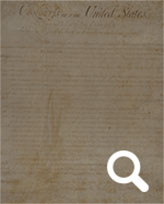Justice Thurgood Marshall: First African American Supreme Court Justice
Justice Thurgood Marshall: First African American Supreme Court Justice
On June 13, 1967, President Lyndon B. Johnson nominated distinguished civil rights lawyer Thurgood Marshall to be the first African American justice to serve on the Supreme Court of the United States. Marshall had already made his mark in American law, having won 29 of the 32 cases he argued before the Supreme Court, most notably the landmark case Brown v. Board of Education of Topeka (1954), which ruled school segregation unconstitutional. Marshall had also been appointed to the Second Circuit of the U.S. Court of Appeals by President John F. Kennedy in 1961 and U.S. Solicitor General by President Johnson in 1965.
As an associate justice on the highest court in America, Marshall continued his lifelong fight against discrimination to protect the constitutional rights of the most vulnerable Americans. He retired from the Supreme Court in 1991 after 24 years on the bench and died on January 24, 1993.
In commemoration of the 50th anniversary of President Lyndon B. Johnson’s June 13, 1967 nomination of civil rights lawyer Thurgood Marshall to be the first African American justice to serve on the Supreme Court of the United States, the National Archives in Washington, DC will display a facsimile of the nomination and Justice Marshall’s opinion in the landmark affirmative action case Regents of the University of California v. Bakke (1978) in which the Court upheld the constitutionality of considering race in college admissions decisions. The documents was on display from June 8 – July 26, 2017.
The National Archives Museum’s “Featured Document” exhibit is made possible in part by the National Archives Foundation through the generous support of Ford Motor Company Fund.
Past Featured Records
-
The Emancipation Proclamation and Juneteenth
Milestones in the long struggle for American freedom
Emancipation Proclamation
President Abraham Lincoln issued the Emancipation Proclamation on January 1, 1863, as the nation approached the third year of the Civil War. Lincoln’s proclamation, which declared “that all persons held as slaves” within the rebellious states “are, and... Read more
-
Harvey Milk Writes to the President
Friday, May 31, 2024 – Monday, June 17, 2024
East Rotunda GalleryHuman Rights at the Ballot Box
In 1978, Californians voted on Proposition 6, which would have banned gay men and lesbians from teaching or otherwise being employed by California school districts. The initiative sponsored by... Read more -
Memorial Day: Honoring the Fallen
Thursday, May 16, 2024 – Wednesday, June 12, 2024
East Rotunda GalleryMemorial Day recognizes and honors the U.S. military personnel who died while serving in the Armed Forces. The first national observance of Memorial Day occurred on May 30, 1868, at Arlington National Cemetery. General John... Read more
-
The Purple Heart Battalion
Tuesday, April 16, 2024 – Wednesday, May 15, 2024
East Rotunda GalleryThe 442nd Regimental Combat Team
None of us thought we were coming home alive. —Lawson Sakai
Following Japan’s attack on Pearl Harbor in 1941, the Roosevelt administration required people of Japanese descent living on the... Read more
Frances Perkins: Champion of Workers’ Rights
Thursday, February 29, 2024 – Monday, April 15, 2024
East Rotunda Gallery“I came to Washington to work for God, FDR, and the millions of forgotten plain common workingmen.” —Frances Perkins
Chances are you benefit from the legacy of Frances Perkins,... Read more








